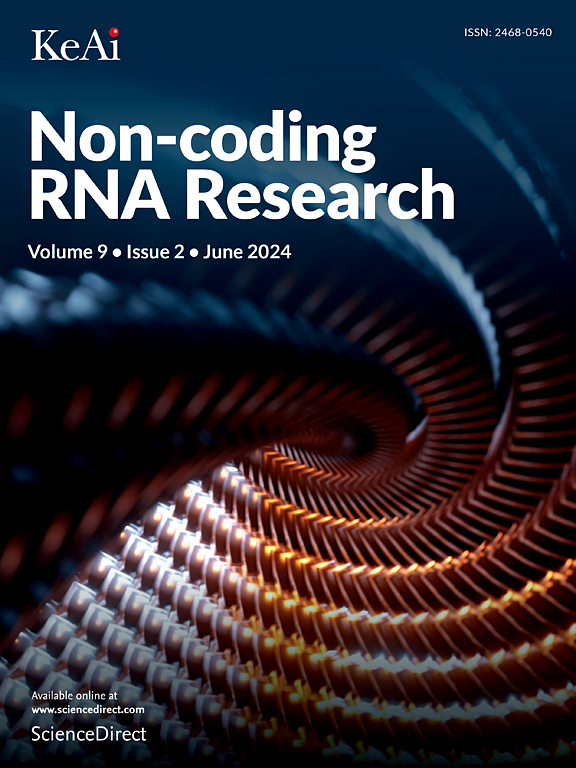microrna在结直肠癌中的多重作用:发病机制和治疗意义
IF 5.9
3区 生物学
Q1 BIOCHEMISTRY & MOLECULAR BIOLOGY
引用次数: 0
摘要
MicroRNAs (miRNAs)是基因表达的重要调控因子,其失调与包括肿瘤在内的多种疾病有关。其中,结直肠癌(CRC)是遗传和表观遗传改变的结果,mirna起着关键的发病作用。尽管许多研究已经研究了CRC中最常见的失调mirna,但对于单个mirna在导致肿瘤发生、肿瘤进展和化疗耐药发展的机制中的具体作用,仍然没有达成共识。这种缺乏清晰度突出了需要更深入地了解miRNA在CRC中的功能。因此,本综述旨在通过研究mirna在主要致癌途径中的作用,强调与该疾病相关的关键mirna,并探索其作为诊断生物标志物和治疗靶点的潜力,来阐明mirna在结直肠癌中的作用。通过提供全面的概述,我们希望揭示mirna在CRC中的复杂和多方面的作用,这可以为更有效的CRC监测和mirna引导的治疗策略的发展铺平道路。本文章由计算机程序翻译,如有差异,请以英文原文为准。
The multifaceted role of microRNAs in colorectal cancer: pathogenesis and therapeutic implications
MicroRNAs (miRNAs) are important regulators of gene expression and their dysregulation is involved in various diseases, including tumors. Among these, colorectal cancer (CRC) is the result of both genetic and epigenetic alterations with miRNAs playing a key pathogenetic role. Although numerous studies have investigated the most frequently dysregulated miRNAs in CRC, there is still no consensus on the specific role of individual miRNAs in the mechanisms leading to tumorigenesis, tumor progression, and the development of chemoresistance. This lack of clarity highlights the need for a deeper understanding of miRNA functions in CRC. Therefore, this review aims to clarify the role of miRNAs in CRC by examining their involvement in major oncogenic pathways, highlighting key miRNAs implicated in the disease, and exploring their potential as diagnostic biomarkers and therapeutic targets. By providing a comprehensive overview, we hope to shed light on the complex and multifaceted roles of miRNAs in CRC, which could pave the way for more effective CRC monitoring and the development of miRNA-guided therapeutic strategies.
求助全文
通过发布文献求助,成功后即可免费获取论文全文。
去求助
来源期刊

Non-coding RNA Research
Medicine-Biochemistry (medical)
CiteScore
7.70
自引率
6.00%
发文量
39
审稿时长
49 days
期刊介绍:
Non-coding RNA Research aims to publish high quality research and review articles on the mechanistic role of non-coding RNAs in all human diseases. This interdisciplinary journal will welcome research dealing with all aspects of non-coding RNAs-their biogenesis, regulation and role in disease progression. The focus of this journal will be to publish translational studies as well as well-designed basic studies with translational and clinical implications. The non-coding RNAs of particular interest will be microRNAs (miRNAs), small interfering RNAs (siRNAs), small nucleolar RNAs (snoRNAs), U-RNAs/small nuclear RNAs (snRNAs), exosomal/extracellular RNAs (exRNAs), Piwi-interacting RNAs (piRNAs) and long non-coding RNAs. Topics of interest will include, but not limited to: -Regulation of non-coding RNAs -Targets and regulatory functions of non-coding RNAs -Epigenetics and non-coding RNAs -Biological functions of non-coding RNAs -Non-coding RNAs as biomarkers -Non-coding RNA-based therapeutics -Prognostic value of non-coding RNAs -Pharmacological studies involving non-coding RNAs -Population based and epidemiological studies -Gene expression / proteomics / computational / pathway analysis-based studies on non-coding RNAs with functional validation -Novel strategies to manipulate non-coding RNAs expression and function -Clinical studies on evaluation of non-coding RNAs The journal will strive to disseminate cutting edge research, showcasing the ever-evolving importance of non-coding RNAs in modern day research and medicine.
 求助内容:
求助内容: 应助结果提醒方式:
应助结果提醒方式:


